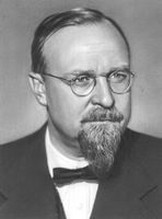
|
|
Alexander Oparin was a Russian biochemist, notable for his contributions to the theory of the origin of life on Earth, and particularly for the “primordial soup” theory of the evolution of life from carbon-based molecules. Oparin also devoted considerable effort to enzymology and helped to develop the foundations of industrial biochemistry in the USSR. He received numerous decorations and awards for his work, and has been called “the Darwin of the 20th Century”. Alexander (or Aleksandr) Ivanovich Oparin was born on 2 March 1894 in Uglich, Russia. When he was nine years old, his family moved to Moscow because there was no secondary school in their village. He attended Moscow State University, majoring in plant physiology, where he was influenced by K. A. Timiryazev, a Russian plant physiologist who had known the English naturalist Charles Darwin, and Darwin’s work was to greatly influence Oparin’s later ideas. He graduated from the Moscow State University in 1917, and became a professor of biochemistry there in 1927. In 1924, Oparin officially put forward his influential theory that life on Earth developed through gradual chemical evolution of carbon-based molecules in a “primordial soup”, at just about the same time as the British biologist J. B. S. Haldane was independently proposing a similar theory. As early as 1922, at a meeting of the Russian Botanical Society, he had first introduced his concept of a primordial organism arising in a brew of already-formed organic compounds. He asserted the following tenets:
Oparin showed how organic chemicals in solution may spontaneously form droplets and layers, and outlined a way in which basic organic chemicals might form into microscopic localized systems (possible precursors of cells) from which primitive living things could develop. He suggested that different types of coacervates might have formed in the Earth's primordial ocean and, subsequently, been subject to a selection process, eventually leading to life. He effectively extended Charles Darwin’s theory of evolution backwards in time to explain how simple organic and inorganic materials might have combined into more complex organic compounds, which could then have formed primordial organisms. His proposal that life developed effectively by chance, through a progression from simple to complex self-duplicating organic compounds, initially met with strong opposition, but has since received experimental support (such as the famous 1953 experiments of Stanley Miller and Harold Urey at the University of Chicago), and has been accepted as a legitimate hypothesis by the scientific community. In 1935, Oparin helped found the A. N. Bakh Institute of Biochemistry (part of the USSR Academy of Sciences). His definitive work, “The Origin of Life”, was first published in 1936. He became a corresponding member of the USSR Academy of Sciences in 1939, and a full member in 1946, and he served as director of the Institute of Biochemistry from 1946 until his death. In the 1940s and 1950s, he supported the pseudo-scientific theories of Trofim Lysenko and Olga Lepeshinskaya, seen by some as a cynical effort to “take the party line” and thereby to advance his own career. Oparin organized the first international meeting on the origin of life in Moscow in 1957, which was to be followed by other meetings in 1963 and in 1970. He was nominated as a Hero of Socialist Labour in 1969 and, the next year, was elected President of the International Society for the Study of the Origins of Life. He received the Lenin Prize in 1974 and the Lomonosov Gold Medal in 1979 "for outstanding achievements in biochemistry". He was also awarded five Orders of Lenin, the highest decoration bestowed by the Soviet Union. Oparin died on 21 April 1980 in Moscow, and was interred in Novodevichy Cemetery in Moscow. Alexander Oparin ResourcesSee the additional sources and recommended reading list below, or check the physics books page for a full list. Whenever possible, I linked to books with my amazon affiliate code, and as an Amazon Associate I earn from qualifying purchases. Purchasing from these links helps to keep the website running, and I am grateful for your support!
|
Back to Top of Page
Introduction | Main Topics | Important Dates and Discoveries | Important Scientists | Cosmological Theories | The Universe By Numbers | Glossary of Terms | A few random facts | Blog | Gravitational Lensing Animation | Angular Momentum Calculator | Big Bang Timeline
NASA Apps - iOS | Android
The articles on this site are © 2009-.
If you quote this material please be courteous and provide a link.
Citations | Sources | Privacy Policy

